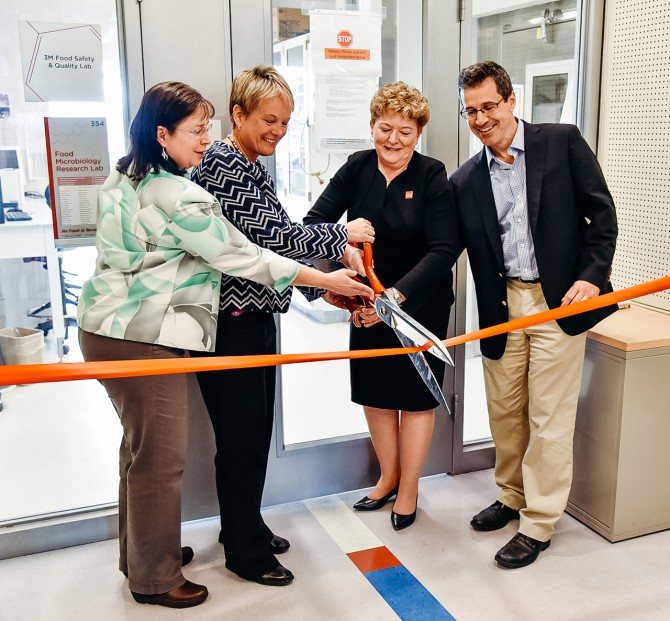3M partnership celebrated with new food safety lab
By Krisy Gashler
For every reported food safety recall, thousands of food products are grown, manufactured, packaged, distributed and safely consumed – which is frankly miraculous.
The consistency and safety of our nation’s food supply is the product of public-private partnerships: government establishing regulations to protect consumers, industry delivering products that meet those guidelines and consumer preferences, and academia informing decisions on both sides.
In April, Cornell’s College of Agriculture and Life Sciences and 3M, the Minnesota-based technology company, celebrated the renewal of their five-year partnership with the naming of the 3M Food Safety and Quality Lab, overseen by Randy Worobo, professor in the Department of Food Science.
The new lab is another link between Cornell and 3M, the company perhaps best known for its iconic Post-it notepads and Scotch tape, that also offers solutions in health care, electronics and food safety, among others. Cornell’s Department of Food Science and 3M have partnered on multiple projects over the past decade, including publishing peer-reviewed research on listeria detection, food safety trainings offered on Cornell’s Ithaca campus and abroad, and a new comprehensive handbook on food safety environmental monitoring, with chapters co-authored by researchers from 3M, General Mills and Cornell.
“Industry is very driven to produce tangible outcomes that provide impact. Working with 3M has really helped us to deliver tools, like the environmental monitoring handbook, that will be used globally,” said Martin Wiedmann, the Gellert Family Professor in Food Safety. “Having access to 3M’s global network of technical experts is also very valuable and has allowed our students and staff to work internationally, driving outcomes that improve food safety and quality.”
Since 2014, Cornell and 3M have collaborated on an annual two-day, hands-on food safety training program that has attracted attendees from more than 15 countries. This year’s workshop will use Cornell’s dairy plant and teaching labs to train food companies on environmental monitoring strategies to reduce food spoilage and food safety incidents, a big focus of 3M’s food safety group. 3M and Cornell have taken their trainings abroad, teaching innovative food safety techniques in Europe, Latin America, North America and Asia.
With Cornell’s help, 3M has also developed molecular testing technology – which food producers use regularly to test for foodborne pathogens including salmonella, listeria and E. coli – that is faster, easier to use and more accurate, said John David, global scientific marketing manager for 3M’s food safety department.
“In working with our customers around the world, we understand that they need more than just the training on how to use our products. Education and training on food safety practices, such as environmental monitoring, is increasingly important as the industry continues to evolve due to new regulations and globalization,” David said. “Working with our partners at Cornell – global experts in their fields – I believe we’ve really made a positive impact on the industry through these efforts, which ultimately helps to keep food safe and protect consumers.”
Kathryn J. Boor ’80, the Ronald P. Lynch Dean of CALS, said she looks forward to continuing to partner with 3M, particularly on reducing food spoilage, a big focus of Worobo’s lab. Boor said efforts in this area will benefit industry and the global population, since food-waste reduction efforts are an integral part of reducing the food industry’s environmental impact.
“The relationship between 3M and Cornell demonstrates how public-private partnerships benefit the university, our industry partners and global consumers,” Boor said.
Krisy Gashler is a freelance writer for the College of Agriculture and Life Sciences.
Media Contact
Get Cornell news delivered right to your inbox.
Subscribe

